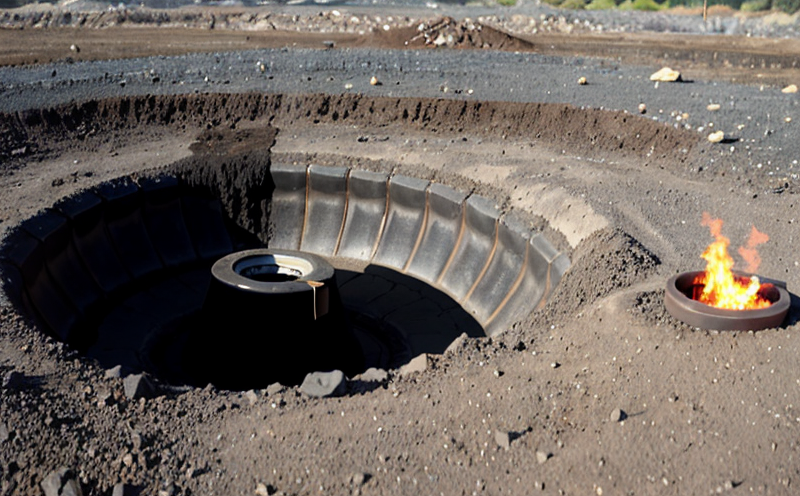DIN 51719 Sulfur in Coal Testing
The DIN 51719 standard is a widely recognized method used to determine the sulfur content in coal. This test is crucial for ensuring compliance with international quality standards and environmental regulations. Sulfur, when present in coal, can lead to significant issues such as increased acid rain formation, air pollution, and corrosion of equipment during combustion processes.
The DIN 51719 procedure involves the combustion of a known mass of coal sample under controlled conditions using a calorimeter. The sulfur content is determined by measuring the amount of SO2 produced during this process. This method ensures precision and accuracy in sulfur measurement, which are critical for maintaining the quality and environmental impact of coal.
The test parameters include the preparation of coal samples to ensure they are representative of the material being tested. Samples are typically dried to a constant weight before analysis. The calorimeter used is crucial as it must be calibrated regularly to maintain accuracy. The combustion process is conducted in an oxygen-rich environment, and the resulting SO2 gas is absorbed by a solution that is subsequently analyzed using colorimetric or titrimetric methods.
The acceptance criteria for DIN 51719 are stringent, ensuring that any coal sample tested must fall within specified ranges to meet quality standards. This testing method is particularly important in sectors like power generation and steel manufacturing where the sulfur content directly impacts operational efficiency and environmental compliance.
Why It Matters
The importance of sulfur content measurement cannot be overstated, especially within the mining sector. Coal with high sulfur levels can lead to increased emissions of SO2 during combustion processes, which in turn contributes significantly to acid rain and respiratory diseases. By adhering to standards like DIN 51719, mines and power plants can ensure they are meeting both environmental and operational requirements.
- Environmental Impact: Reducing sulfur emissions helps mitigate the effects of acid rain and air pollution, leading to healthier ecosystems and communities.
- Economic Efficiency: Ensuring coal quality through DIN 51719 testing can lead to better combustion efficiency, reducing fuel consumption costs.
- Regulatory Compliance: Meeting international standards like DIN ensures compliance with environmental regulations, avoiding potential fines and penalties.
The accuracy of sulfur content measurement is vital for industries relying on coal. Proper testing not only enhances operational performance but also contributes to sustainable practices, aligning with global efforts towards cleaner energy solutions.
Eurolab Advantages
At Eurolab, we provide comprehensive DIN 51719 sulfur in coal testing services tailored to meet the specific needs of mining and power generation sectors. Our team of experts ensures that every sample is tested using state-of-the-art equipment and methodologies.
- Accreditation: We are ISO/IEC 17025 accredited, ensuring our laboratory meets the highest standards in technical competence and reliability.
- Experience: Our team has extensive experience in coal testing, providing accurate and reliable results every time.
- Technology: Equipped with advanced calorimeters and other precision instruments, we ensure consistent and precise sulfur content measurements.
- Speed: Rapid turnaround times without compromising on accuracy allow for timely decision-making and operational planning.
We understand the importance of DIN 51719 compliance and deliver results that are not only accurate but also actionable, helping our clients stay ahead in a competitive market.
Customer Impact and Satisfaction
- Enhanced Quality: By ensuring coal samples meet DIN 51719 standards, customers can improve the quality of their products, leading to better performance in various applications.
- Environmental Benefits: Our testing helps minimize environmental impact by reducing sulfur emissions during combustion processes.
- Economic Savings: Accurate testing leads to more efficient fuel usage, resulting in cost savings for our clients.
- Regulatory Assurance: Compliance with international standards ensures that customers are meeting regulatory requirements and avoiding potential legal issues.
Clients have consistently praised Eurolab’s reliability and accuracy. Our commitment to quality has earned us a reputation as a trusted partner in the mining industry, providing services that contribute directly to improved operational efficiency and environmental stewardship.





